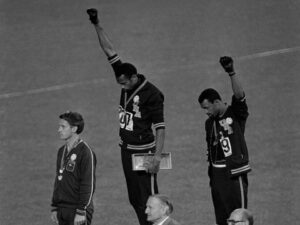
Politics can have a significant impact on sports in various ways. Here are some ways politics affects sports:
Funding
Governments often provide funding for sports, which can influence the development of sports infrastructure and the quality of training facilities for athletes.
Here are some possible examples:
- Influence on sports organizations: Political funding can give politicians and political parties influence over sports organizations. In some countries, political parties provide funding to sports organizations in exchange for support or favors. This can lead to a conflict of interest and compromise the integrity of the sports organization.
- Hosting major sporting events: Political funding can be used to host major sporting events like the Olympic Games or the World Cup. This requires a significant investment in infrastructure and facilities, which can be financed through government funding. The success of hosting these events can have a positive impact on the economy, tourism, and the country’s reputation.
- Sports development programs: Political funding can also be used to support sports development programs, particularly in disadvantaged communities. This can help to promote physical activity and healthy lifestyles, as well as provide opportunities for young people to develop skills and talents in sports.
- Political boycotts: Political funding can also be used to support or oppose political boycotts of sporting events. For example, some countries may refuse to participate in a sporting event hosted by a country they disagree with politically, or may call for a boycott of a particular event to protest against a particular policy or action.
International Relations
Sports can be used as a tool for diplomacy between nations, where sports events are organized as a way to promote friendly relations between countries.
International Relations can have a significant impact on sports in several ways, including:
- Diplomacy and Sportsmanship: International sports events can serve as a platform for promoting diplomacy and improving relations between countries. Diplomacy can help resolve political and economic issues between countries, and sportsmanship can encourage mutual respect and understanding.
- Political Boycotts: Sometimes, countries boycott sporting events for political reasons, such as to protest a government’s policies or actions. For example, in 1980, the United States and several other countries boycotted the Summer Olympics in Moscow to protest the Soviet Union’s invasion of Afghanistan.
- Economic Implications: Major sporting events such as the Olympics or the World Cup can bring significant economic benefits to the host country. However, hosting such events can also be expensive, and the cost can have a significant impact on a country’s economy.
- Cultural Exchanges: Sporting events can provide opportunities for cultural exchange and appreciation. For instance, fans from different countries can learn about each other’s cultures and traditions through sports.
- Promotion of Nationalism: Sporting events can promote nationalism, both in positive and negative ways. A country’s success in a major international sporting event can lead to a surge in national pride and unity. On the other hand, nationalism can lead to aggressive and sometimes violent behavior among fans.
Policies
Policies made by governments can have a direct impact on sports. For example, laws and regulations on drug use, safety measures, and other issues can have a significant impact on the way sports are played and how athletes perform.
Here are some examples:
- Funding: Governments may allocate funds towards developing sports infrastructure, sponsoring sports events or supporting athletes. Lack of funding or inadequate funding may lead to the neglect of sports programs and facilities.
- Promotion: Political policies can promote certain sports and discourage others. Governments may incentivize participation in certain sports, and this can lead to the growth and popularity of those sports with their goal on how to get more sales.
- Regulation: Political policies can regulate sports activities by establishing rules, regulations, and laws. This can include issues such as doping, fair play, and athlete safety.
- International relations: Sports can be used as a tool for diplomacy, with political policies being used to facilitate or hinder sports-related exchanges between countries.
- Hosting major events: Governments may bid for and host major international sports events like the Olympics or World Cup, which can have significant economic and cultural impacts on the country.
- Human rights: Governments may use sports as a platform to promote human rights issues, such as gender equality, racial equality, and LGBT rights.
Nationalism
Political events can spark feelings of nationalism, which can translate into increased support for national teams and athletes. Political leaders often use the success of their country’s athletes to boost their popularity.
Nationalism can have a significant impact on sports in several ways:
- National Pride: Nationalism can evoke feelings of pride and passion among people for their country and its achievements in sports. This can lead to increased support and interest in sports teams and events, and motivate athletes to perform better for their country.
- International Competitions: Nationalism can also affect international competitions such as the Olympics or World Cup. The success or failure of a national team can be seen as a reflection of the strength and worth of the country itself, and can evoke strong emotional responses from supporters.
- Rivalries: Nationalism can also create rivalries between countries, which can add excitement and intensity to sports events. These rivalries can sometimes lead to aggressive and violent behavior among fans, however, which can create safety concerns and detract from the spirit of competition.
- Stereotyping: Nationalism can sometimes lead to the stereotyping of athletes from different countries, which can lead to unfair treatment and discrimination. For example, athletes from certain countries may be viewed as aggressive or unskilled, regardless of their actual abilities.
- Politics: Nationalism can sometimes become entangled with politics, and sports events can be used as a way to assert dominance or to make political statements. This can lead to boycotts, protests, and other forms of political activism that can impact the sports world.
Boycotts
Governments sometimes use sports events as a means of protest or boycott against other countries. For example, during the Cold War, the United States boycotted the 1980 Moscow Olympics to protest the Soviet Union’s invasion of Afghanistan.
Here are some ways political boycotts can affect sports:
- Participation: A political boycott can lead to the withdrawal of countries or individual athletes from sporting events. This can impact the overall competitiveness of the event and may result in fewer opportunities for athletes to compete.
- Host country: Political boycotts can also lead to the relocation or cancellation of sporting events if the host country is targeted by the boycott. This can result in significant financial losses for the organizers, sponsors, and the host country.
- Publicity: Political boycotts can generate negative publicity for the sporting event, sponsors, and the participating countries. This can damage the reputation of the event and the sport itself, leading to a decline in interest and support from fans.
- Diplomatic relations: Political boycotts can also strain diplomatic relations between countries, particularly if the boycott is seen as a hostile action by the targeted country.
- Economic impact: Political boycotts can have a significant economic impact on the host country and the local economy. This can include lost revenue from tourism, sponsorship, and broadcasting rights, as well as job losses and reduced investment in infrastructure.
Identity
Sports can also play a significant role in shaping individual and national identities. For example, the success of national sports teams can help foster a sense of national pride and identity.
Political identity can affect sports in a number of ways:
- Athlete activism: Athletes may use their platform to advocate for political causes that align with their identity, such as racial justice, gender equality, or environmentalism. This can involve kneeling during the national anthem, wearing symbolic clothing, or making political statements in interviews.
- Fan behavior: Fans may be more or less likely to support athletes or teams based on their political identity. For example, fans may support or boycott a team based on the political views of its owner or star player.
- Sponsorship: Companies may choose to sponsor athletes or teams based on their political identity, as a way of aligning their brand with a certain cause or demographic.
- Sports policy: Political identity can also influence sports policy, such as funding for sports programs, construction of new stadiums, or regulation of performance-enhancing drugs.
- International relations: Political tensions between countries or regions can spill over into sports, such as when teams from rival nations face off in high-stakes competitions like the Olympics or the World Cup.
Overall, politics can have a far-reaching impact on sports, from shaping policies and funding to influencing international relations and identity.

